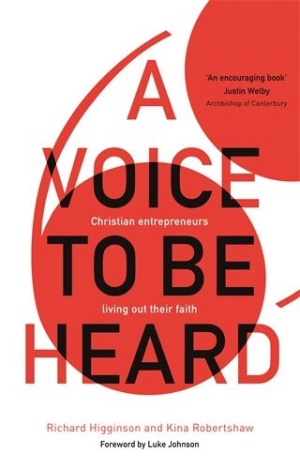
DARREN CRONSHAW reads a book celebrating Christian entrepreneurship…
Richard Higginson and Kina Robertshaw,
A Voice to Be Heard: Christian Entrepreneurs Living Out Their Faith,
IVP, London, 2017
ISBN-13: 978-1783595655

“Some Christians may feel their calling is to serve through church roles such as leading worship, but, thankfully, there are an increasing number whose imagination is captured by social issues and global complex problems that they can address as entrepreneurs.”
“Should I stay at Swinburne Uni and study innovation and entrepreneurship, or should I leave and study music to be a church worship leader?” That was the conundrum that the young adult Karen student from Myanmar was grappling with. He was drawn in both vocational directions by twin passions for music and business.
When at Swinburne, he loved learning new paradigms and skills for thinking outside the box. When at church, he loved leading worship and youth ministry. At church, he regularly felt affirmed in his worship leadership gifts, but had an impression that business was a lesser and even distracting calling.
We talked these issues through when he came to see me as a Swinburne chaplain. I asked curious questions and sought to affirm the virtue of creative callings such as music but equally the creative opportunities of business and social enterprise that his Swinburne studies could lead towards. Reading A Voice to be Heard reminded me of our recent conversations. It is an ideal book for those like this student from Myanmar who are wondering how their faith might integrate with a vocational interest in entrepreneurship.
Kina Robertshaw grew up in Zambia, developed businesses since she was 10 and was nominated Zambiam Businesswoman of the Year in 2009. She studied theology at Ridley Hall, was ordained and researched Christian entrepreneurs including interviewing 50 about what makes them tick. Richard Higginson is director of ‘Faith in Business’ at Ridley and was Robertshaw’s research supervisor and now co-writer.
They introduce the reader to Biblical examples of entrepreneurs, such as Jacob the animal trader and God the visionary, risk-taking Creator in whose image we are made. They narrate some historical business heroes such as George Cadbury the Quaker who developed chocolate products as an alternative to alcohol and offered housing to his staff. And they discuss how entrepreneurs such as Richard Branson of Virgin and Anita Roddick of Body Shop have helped reclaim a positive image of entrepreneurs. Roddick has strongly advocated for her idea of “corporate social responsibility” and her story makes me think that in Australia we need to do more work in celebrating the stories of local entrepreneurs who are fostering similar social innovation.
The majority of the book, however, focuses on the contemporary experience of 50 Christian entrepreneurs and how they understand themselves, how they practice being entrepreneurial and how the church supports them (or not). There are stories of succession planning, takeovers, turnarounds, bankruptcy, values preservation, staff care and environmentally and socially drive business plans. The writers include chapters on risk-taking, stewardship, leadership models, avoiding unethical practices, prayer, perseverance and how business can foster God’s Kingdom purposes (through making the world a better place, embodying Christian values, witnessing by word and charitable giving). In finding Christian entrepreneurs to interview, the authors looked not just for people of Christian faith but those who see their companies as an expression of their faith.
I especially appreciated reading the vocational heart of different entrepreneurs. For example, Gary Grant, toy retailer, loves to see “the delight and pleasure on young children’s faces”. David Ball, construction company chairman, delights in having developed concrete without needing to include the environmentally damaging cement. Mike Clargo helps workers evaluate meetings. Natasha Rufus Isaacs started an ethical fashion store ‘Beulah’ to support Indian women who had been victims of human trafficking and to conscientise Western women. Jeremy Higham makes short films about what is distinctive about companies, and his vision is to foster “re-enchantment” in the business world and “get it singing again”. Simon Macauley developed new methods for recycling carpet.
One of my favourite stories was Nigel Walter, an architect and founder of Archangel that specialises in helping faith communities make a better fit between their buildings and their mission. His main skills are to listen to what lies below the surface of a customer’s requests and to embolden them to be prepared to take risks. He explains his vocation as an architect is like someone joining a group on a journey: “You are invited on the journey because you have knowledge or experience that they know you lack, but need. I see our role as being a critical friend for the duration of that journey. That sometimes means challenging people. If you’re not able to challenge your clients you are not doing your job, and that involves taking risk for yourself – ultimately, you may lose the job. But in the end, it is the client’s project, not yours, and it is just as important to know when to stop challenging: ‘a time to speak and a time to remain silent.”
This is a helpful posture for any consultant, supervisor or collaborative leader.
A Voice to be Heard is thoughtful reading for entrepreneurs in business or the not-for-profit sector and for those who support them including pastors. It would also be an ideal textbook for students of faith and work or social entrepreneurship, and for research methodology students as a model research project. A similar project with Australian Christian entrepreneurs would be valuable.
Some Christians may feel their calling is to serve through church roles such as leading worship, but, thankfully, there are an increasing number whose imagination is captured by social issues and global complex problems that they can address as entrepreneurs. I am going to give copies of this book to my entrepreneurial brother and the eager student from Myanmar whose biggest potential may lie in being a community transformer as an entrepreneur beyond the walls of the church.
This review was originally published in Zadok Perspectives 141 (Summer 2018).





